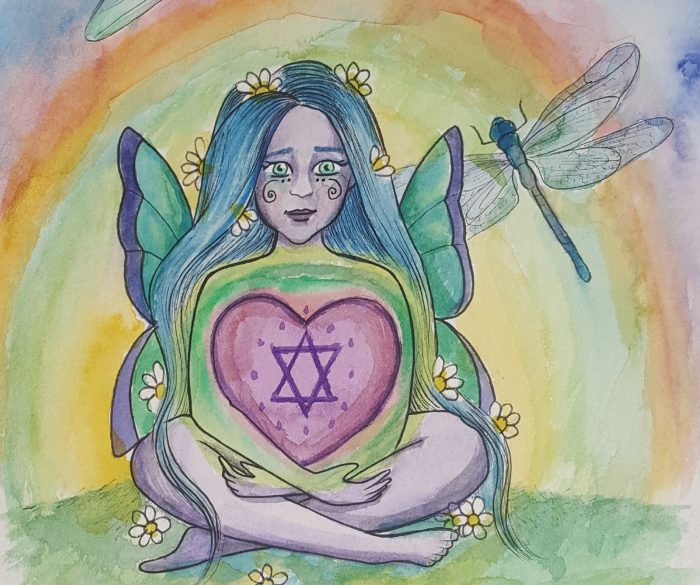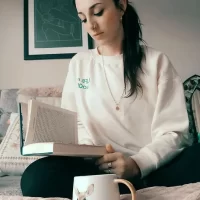“Without love, you feel like you’re not welcome on this planet.” ~ Richard, “The Undateables”
~
We all grow up with our own concept of what love is, what it means, and what it looks like.
We learn from our role models growing up, usually our parents first and foremost. Then later on, we learn from peers and even from what we see in movies.
But what do we really know about this mysterious energy we wish to have in our lives? I wonder how many of us realise all the things that love isn’t.
For years, I tried to figure out the difference between love and in love. We hear it in films all the time, we see it in real life too. People state that they are so in love, or that they just love someone as a friend. Perhaps what we could say (to differentiate between love and other emotions) is, “I love you, but I don’t have romantic feelings toward you,” or, “I love you, but I relate to you as a friend.”
My own life played out with me being a serial monogamist, and I have put my whole heart into every relationship I’ve ever had. There is not a single one that I would differentiate as in love as opposed to just love. My conclusion is that they are one and the same—because love is just love.
Love is always the constant in the equation; it is the other feelings and emotions that make the circumstances different.
I have been involved with people whose idea of love was actually the definition of approval. For them, whenever they were not being approved of by a partner or parent (i.e., when they were having an argument or disharmony of some sort), they believed that their partner/parent didn’t love them anymore. When things got back on track, they believed that they were once again loved. Using this concept, it would appear as though love could be turned on and off like a tap.
I’ve heard many speak of love as though it has compartments or levels, thus making it possible (in their concept of love) to give 10 percent to one person and 80 percent to another, or even not have enough love for everyone!
Love, like other emotions and energies, carries its own frequency. This frequency vibrates within the heart chakra, and a person’s capacity to give love is only governed by the amount that they love themselves. If we consider our heart to be like a pie with slices cut out, we can imagine that a person with only three quarters of a pie can only love another person three quarters of a pie worth. Even though this person is using 100 percent of their capacity to love, they are not using their whole potential (because they do not yet possess access to their whole pie).
This is where we come to unconditional love.
When reading anything about self-healing and development, we are likely to come across something relating to unconditional love. So what exactly does it mean?
Unconditional love means possessing the whole pie.
Possessing the whole pie is difficult, however, because it means undoing all our issues that removed our slices of pie in the first place. Perhaps we have been betrayed, hurt, or not given enough love when we were growing up. All these things cloud our ability to let love shine from us. We start intermingling it with our unresolved issues: approval, lust, need, desire, obsession, control, or passive aggression, to name a few.
We then have unrealistic expectations that if someone really loved us, they would just know how to keep us happy without us saying a word. Or we might use love as a bargaining tool: “If you really loved me, you’d give me the thing I want.”
Many years ago, I made a boyfriend feel so bad about leaving me alone when I was upset that he felt forced to call work to say he couldn’t come in. Looking back, I realise I had childhood issues relating to abandonment. I was projecting this onto him as if he was doing something unreasonable by going to work and believing that if he really loved me, he would stay with me.
If we look at ourselves with awareness, we can strip back our issues to find the real reasons we might be using the manipulation of what love is in order to gain something.
I also found my own misconceptions about unconditional love damaging. As I understood it, unconditional love meant accepting everything about another person, and I did this for many years. I wish I had read, in one of the self-development books I sought out over a period of 17 years, one simple sentence that sounded something like this:
Unconditional love does not mean accepting bad behaviour, letting other people cross your boundaries, being the subject of passive aggression, or allowing others to project unhealed parts of themselves onto you.
I would have saved myself a lot of pain caused by over-staying in toxic relationships if I had read and understood a sentence like that.
When we truly figure out unconditional love, we realise that it means having healthy boundaries for ourselves, because when we discover all the missing pieces of our pie, we can experience love that radiates without becoming blocked. We also realise that we can still love unconditionally and say “No.” We can still love unconditionally and have a disagreement with someone. We can still love unconditionally and have boundaries in place for what is and isn’t acceptable for us.
If we are using love as some sort of ultimate judgment tool, we have not understood it yet.
If we are confusing love with need, desire, control, approval, or projecting our bullsh*t onto other people in the name of love, there is still work to be done on ourselves.
No one from an outside perspective truly knows what is in our hearts. Only we do.
I invite you to ask yourself what is truly in your heart, and whether the love you are experiencing is clouded by unhealed issues.
It is never too late to start addressing them, and unlock access to your entire pie!











Read 31 comments and reply